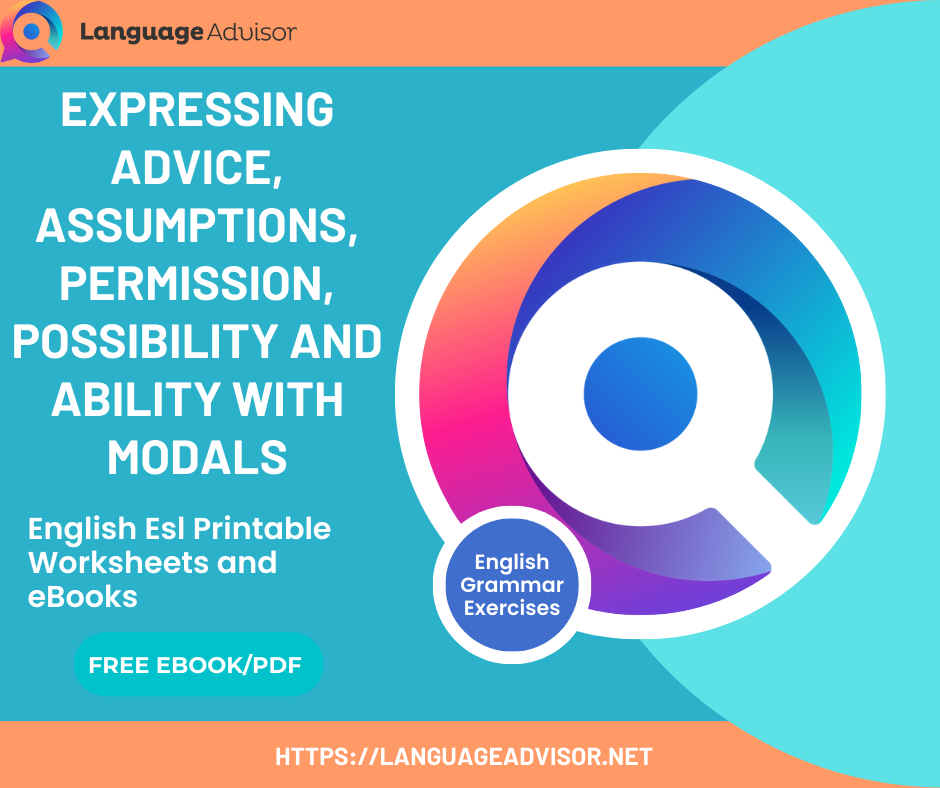Expressing advice, assumptions,permission,possibility and ability with modals. English grammar with exercises. Free eBook and Free printable PDF. Esl printable Worksheets
Expressing advice, assumptions,permission,possibility and ability with modals

Expressing advice, assumptions,permission,possibility and ability with modals
Modals of Ability
There are 2 modals of ability, can and could (past tense). Use the following formula when talking about ability with these modals: subject + modal + base form of the verb.
- I can speak French.
- I can’t speak Russian.
- Last year I could run very fast.
- Last year I couldn’t play basketball .
To ask a question, simply invert the modal and the subject: modal + subject + base form of the verb
- Can you speak Spanish? . Yes, I can. No, I can’t.
- Could you drive ten years ago? Yes, I could. No, I couldn’t.
Modals of Permission
The most common modals of permission are can and may. We use the same formula : subject + modal + base form of the verb.
- He can come to dinner with me if he wants to .
- He can’t come to dinner with me. I don’t like him .
- You may borrow my car if you wish .
- You may not borrow my car. I never loan it to anyone . (Please note, there is no contraction for may not.)
To ask a question, we use the formula: modal + subject + base form of the verb
- Can we sit with you at the concert? Yes, you can. No, you can’t.
- May I borrow 5 dollars? I forgot my wallet . Yes, you may. No, you may not.
Modals of Advice
There are several modals we use to give advice to someone: should, ought to, and had better. Please note that even though had better looks like a past tense verb, in this case it is used in the simple present. We use the same formula: subject + modal + base form of the verb.
- You should study for the test .
- You shouldn’t study for the test .
- She ought to see a doctor .
- She shouldn’t see a doctor . (Note, these is no negative for ought to).
- He had better pay his rent today .
- He had better not pay his rent today .
All modals of advice, use should to ask a question: modal + subject + base form of the verb
Should I buy new coat? Yes, you should. No, you shouldn’t.
Should and ought to mean the same thing. They are used to simply give advice to someone . Had better is much stronger. We use this modal when something bad might happen if you don’t follow the advice.
Modals of assumptions
The modal verb ‘will’ is used to help us assume a fact. Your assumption might be true or not.
Normally, ‘will’ has a reference to the present or future tense, but sometimes it is followed by a perfect infinitive structure which makes it possible for ‘will’ to refer to the past tense.
- I thought it will have been finished by Monday.
- She won’t talk to me. We broke up two months ago
Although the modal verb ‘should’ is the past tense of the verb ‘shall,’ but when we are talking about assumptions it functions as a present or future verb unless there is a perfect infinitive structure after it.
- They should be married by now.
- We should have been graduated by now.
Modals of Possibility
In English, there are three main modals of possibility: may, might, and could.
We use these modals to describe a possible action. Because of the uncertainty, these modals are often used to talk about the future, though sometimes we want to express possibility in the present.
- I may go traveling next year. (future possibility)
- My keys might be in the car. (present possibility)

Exercises
Expressing advice, assumptions,permission,possibility and ability with modals
EXPRESSING ADVICE
SHOULD HAVE/COULD HAVE + PAST PARTICIPLE
EXERCISE 1.
Complete the sentences with SHOULD HAVE-SHOULDN’T HAVE/COULD HAVE-COULDN’T HAVE+ PAST PARTICIPLE
- You had already eaten. You ________________________ hungry. (to be)
- Monica _____________________________ at the shoe shop this morning. I didn’t see her there. (to be)
- I ____________________________ Paul knew about Bob’s death. (to think)
- John ______________________________ the race if he had tried. (to win)
- I __________________________ Tom this morning, but I forgot. (to phone)
- You ____________________________ him that he is lazy. He is really angry with you now. (to tell)
- I _______________________________ to the airport to pick up Aaron, but my car didn’t work. (to go)
- Our dog was ill. We ___________________________ it on its own. (to leave)
- The letter I sent you ____________________________ by now. (to arrive)
- Don’t worry if Jenny is late. She _____________________ the train. (to miss)
- I don’t know who rang, but it _______________________ David. (to be)
- “I didn’t sleep last night.” “It was your own fault, you ___________________ to bed so late!” (to go)
- You were lucky! You _________________________ killed! (to be)
- What Jamie told you was supposed to be a secret. You __________________ her! (to tell)
- I ___________________________ that car, but I decided to look at a cheaper one. (to buy)
Expressing advice assumptions permission possibility and ability
EXPRESSING ASSUMPTIONS
EXERCISE 1.
Rephrase the following sentences using the modal verbs suggested.
Eg. I’m sure that Mary has been to the sea side. Look how tanned she is!
Mary must have been to the sea side. Look how tanned she is!
- John is bound to phone if he’s not coming. He would never keep us waiting in vane. /BE SURE/
- John________________________________________
- I’m positive that my husband hasn’t cheated on me. /CAN’T/
- My husband ___________________________________________
- 3. Jane is never late. I’m sure that something happened on her way here. /MUST/
- Jane is never late. Something___________________________________
- 4. It’s six o’ clock. Lucy is sure to have come back from work. I’ll phone her and see. /WILL/
- It’s six o’ clock. Lucy________________________________________
- James looks a bit tired. Perhaps he stayed up late last night. /MIGHT/
- James looks a bit tired. He_____________________________________
EXERCISE 2.
Complete the sentences using MUST/CAN’T/MUSTN’T*/WILL/MAY
- Laura ____________ have a difficult situation at home. When she comes to school she’s often sad or upset.
- “The doorbell has just rung, mum. Who can it be?”
- “It _____________ be the postman. He always comes at this time in the morning.”
- Faith ___________________ have gone to work today. She was really ill last night. She couldn’t even stand up.
- “Why did Anna fail her exam? She was very well prepared!”
- “I have no idea. They ____________ have asked something that she didn’t know, or she ______________ have forgotten everything just before entering the room.”
- I have told you several times, kids! You ________________ touch the oven while mummy is cooking. It’s very, very hot and you will burn your little fingers.
Expressing advice assumptions permission possibility and ability
EXPRESSING PERMISSION
MUSTN’T/DON’T HAVE TO/CAN’T/SHOULDN’T
EXERCISE 1.
Choose mustn’t, don’t have to, can’t, or shouldn’t to put in the gaps.
- Sara _____________ take an English course because she was born in Wales.
- This homework assignment is optional so you _____________ do it.
- You ____________ mix chemicals such as ammonia and chlorine when cleaning. If you do, the fumes can kill you.
- Tom ____________ leave his bicycle on the street without locking it; someone might steal it.
- Karen _________ get her driver’s license yet because she’s only 15.
- Nick really _____________ drive after having had so much wine to drink.
- I ___________ believe it! The Italian government has reimbursed me for nine hundred thousand lire!
- Don’t worry, you _____________ wash the dishes. You cooked, so I will do it.
- We ___________ forget to call Dad on Fathers’ Day.
- You ___________ believe everything you see on TV.
EXERCISE 2.
Choose the best word/phrase to complete the sentence.
- You don’t have to/mustn’t tell anyone what I’ve just told you: it’s a secret.
- They shouldn’t/can’t go swimming during a thunderstorm; it could be dangerous.
- You don’t have to/mustn’t buy any milk, as I bought some this morning.
- I’d love to eat some of that chocolate, but I’m on a diet so I shouldn’t/don’t have to.
- Joanna shouldn’t/can’t spend the weekend at her friend’s house because her father wouldn’t allow it.
- Of course it would be convenient to park here, but this space is for handicapped people, which we are not, so we can’t/mustn’t.
- We’d like to invite Ben out for dinner tonight, but his phone has no answering machine installed so we can’t/mustn’t.
EXPRESSIONS WITH CAN’T
EXERCISE.
Complete the dialogues choosing the proper expression among the following:
Can’t bear + ing form/+ I infinitive/object
Can’t stand + ing form/object
Can’t help + ing form
Example:
“Do you like Milan?”
“No, I can’t stand living in Milan, there aren’t enough parks.”
- “What has happened to her?”
- “She has been sad since he went abroad. She knows he doesn’t love her anymore but she ______________(to think) of him.”
- “You must like your job! You even go to work on Sundays.”
- “We ____________________ (to work) on Sunday, but since the mall is open, our shop has to be open too.”
- “Why is Father Locksley so angry with Matt?”
- “Last Sunday during mass Father Locksley said ‘dog’ instead of ‘god’ and Matt ________________ (to laugh) about it.”
- “Do you go on holiday with them?”
- “No, we don’t. You know, we love camping in the middle of nature but they ________________ (to camp), because they have to share a bathroom with other people.”
- “I’ve told you a hundred times. Why don’t you listen to me? Don’t do that.” “Stop it! I ______________people ___________(to shout) at me! “
- “I used to smoke a pack of cigarettes a day, now I _________ the smell of cigarettes.”
- “Well, I ______________people _____________(to smoke) in front of me!”
- “Did he really leave his wife on the highway?”
- “Yes he did. He told the judge that he drove away because he ______________ (to wait). The judge said he understood as he was married but according to the law he had to fine him $500.
- “You look like you’re in love.”
- “I am. He makes me feel so special. Every morning he tells me that he ________________ (to look) at me, because I’m so beautiful!”
EXPRESSING ABILITY
CAN / BE ABLE TO
EXERCISE 1.
This is Jenny’s diary about her holiday in the mountains. Form complete sentences using COULD/COULDN’T and WAS/WERE ABLE TO.
E.g. Sunday >>> climbed the mountain. Had a picnic there.
We were able to climb the mountain. We were able to have a picnic there.
- 1. Monday >>> it was too cold to sleep. Heard the noise of animals.
- 2. Tuesday >>> went white water rafting. Saw beautiful views.
- 3. Wednesday >>> took photographs of the landscape.
- 4. Thursday >>> discovered a beautiful river. Fished for our food.
- 5. Friday >>> weather was so awful that we didn’t walk.
- 6. Saturday >>> picked up mushrooms. Went back home.
EXERCISE 2.
Complete the sentences using CAN/BE ABLE TO.
e.g. Can you help me with this exercise?
- It hasn’t been a busy day. Teachers………………………to correct all the homework.
- I’m taking an exam tomorrow. I hope I………………………to pass.
- If you give me your details, I ………………………to fill in these documents.
- I………………………understand what was going on.
- If only you told them that you need money, they might……………………… to help you.
CAN AND EVEN
EXERCISE 1.
Finish the sentences using your own words using can/even or can’t/even.
Example:
She is a terrible cook; she can’t even boil an egg.
My pay rise was so good; I can even buy a new car.
- I do everything on my laptop, it____________________________________
- He has broken both his arms, _____________________________________
- Technology is everywhere, _______________________________________
- He is very intelligent but has no common sense, _______________________
- She isn’t married, she __________________________________________
EXERCISE 2.
Transform the sentences using the structure above.
Example:
He is so nervous he fails all of his exams.
He can’t even pass an exam he is so nervous.
- Their child is extremely intelligent. He does equations in his head.
- We always go on holiday with the dog. We book hotels that cater for them.
- Her fear of spiders is so bad she faints at the sight of them.
- He is such a good salesman, they say he sells ice to Eskimos.
- Please come to my party. You can bring a friend.
SPECULATIVE PHRASES
EXERCISE 1.
Fill in the following sentences according to the degree of uncertainty expressed using may/might/could, then transform the sentences using a different form.
Example:
They look exhausted. They might have been dancing all night.
They look exhausted. They could have been up all night.
- She ______________ go out this evening but she’s not sure yet.
- I have lost my umbrella! Don’t worry, you _____________ have left it at work.
- The weather is getting worse. It _______________ rain this weekend.
- She speaks excellent French. She _______________ have been to Paris.
- He ____________ have caught the train at 08.30.
- Will you leave tomorrow? I _____________, but I still have to plan my holiday.
- What’s his name? It ____________ be Smith, but I can’t remember.
- Don’t touch that! It ______________ be dangerous.
- I am waiting for an answer. Don’t worry, he ____________ reply by the weekend.
- Jane is not at home, she ____________ be out with her husband.
PERMISSION/POSSIBILITY/ABILITY
EXERCISE 1.
Decide how ‘can’ and ‘could’ are being used in the following sentences. Are they being used for ‘permission’ ‘possibility’ or ‘ability’’ Write the use next to each sentence.
- I can ski. I learnt when I was a child.
- Can you tell me the time please? No, I’m sorry I can’t. I don’t have a watch.
- What time could we meet this afternoon?
- When I was a child, I could stay up until 10.00 pm to watch TV.
- He could swim really well when he was a child but now he doesn’t practise anymore.
- Can we leave early today please? Yes, of course you can.
- Please tell me the news! Couldn’t you at least tell me who it concerns?
- I’m the boss, so I can do what I like!
- Please don’t tell me what I can and can’t do!
- He had such a problem to get up for school when he was younger. He could never make it to school on time.
EXERCISE 2.
Complete the following exercise using the correct form of ‘can’.
- I ______________________ (not phone you for a long time as I’ve been very busy.
- ____________ you _____________ come to the party next Saturday night?
- Have you heard Fred’s level of Italian. He has improved so much. A few months ago he _______________ (not) even string two words together.
- We _________________ attend the meeting yesterday, but we __________(not) ________________ attend next week.
- ______________ you phone Debbie for me because I don’t have time to do it myself?
- We __________________ visit our friends whenever we want.
- ________________ (not) you just shut up? You’re always going on and on about the same old things.
- I _________________________ snowboard for one whole year now.
- ________________ she _______________ to finish her homework yet?
- No, she ___________________ (not) do it yesterday as her mother wanted her to help out with the housework.
MODALS IN THE PAST
EXERCISE 1.
Fill in the blanks with the suitable modal verb, bearing in mind that more than one choice is possible. They could also be in the negative form.
must have / can’t have / may have/ might have / could have / should have
e.g. I can’t find my wallet! I must have left it in the car.
- I was in the midst of a lot of people. Jim _________________ noticed me.
- Jackie woke up late and dashed off to the station. She ______________ missed the train.
- He hasn’t replied to my letter yet. He ____________________ received it.
- You were drinking and driving on the motorway, going through red lights?! You ___________ been killed!
- The due date was last Friday. I _____________ posted the application letter on Thursday.
- Why did you tell him? It was a secret! You ____________ said anything!
- The dog is barking. It ________________ heard something.
- I jumped from the plane and my parachute didn’t open at first. I ____________ been injured!
- She forgot my birthday again. She _________________ looked in her diary.
- What happened to your neighbour’s cat? Do you think it _____________ got lost?

Expressing advice assumptions permission possibility and ability
BROWSE THE EBOOK ONLINE OR DOWNLOAD THE PDF FOR FREE

Expressing advice assumptions permission possibility and ability
All downloads are in PDF format





